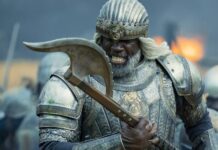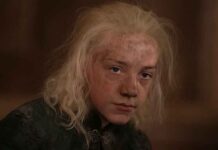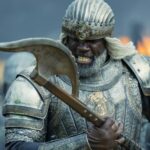With the release of Marvel Studios’ Dr. Strange in the Multiverse of Madness, we’re waist-deep in Phase 4 of the MCU, and it’s all about the multiverse: the coexistence of an infinite number of different universes and “variants” of our beloved superheroes. And yet, it seems even across these endless versions of reality, we still can’t have an epic fantasy movie or series that doesn’t demonize a female character for becoming too powerful.
SPOILERS AHEAD
In Multiverse of Madness, we’re reintroduced to Benedict Cumberbatch’s Steven Strange, who’s still adjusting to life after the “blip” wiped out half of humanity and all life forms for five years in Infinity War. Now, Strange finds himself trying to protect America Chavez—a teen with the rare power to travel through universes—from none other than fellow Avenger Wanda Maximoff, played by Elizabeth Olsen.
As a refresher, in WandaVision, reeling from the loss of her android-lover Vision, Wanda’s grief and tremendous power briefly create an alternate reality in which Vision is alive, and they share two kids. When Wanda discovers her alternate reality has resulted in a whole town being held hostage, she gives up her fantasy, faces her grief, and, in the final moments of the series, we watch her begin to use the Darkhold. For non-Marvel nerds, the Darkhold is an ancient, evil, all-powerful magic, which Wanda believes can reunite her with her lost children. In Multiverse of Madness, that’s precisely why she wants America: If she kills and steals America’s abilities, she could travel to a different universe in which her two kids exist, and be with them. The Darkhold has given her essentially all the power in the world, transforming her into the prophesized Scarlet Witch—but it’s also corrupted her beyond recognition. She’s willing to destroy and kill anyone, including a child, to get to her own kids, and have access to every universe in existence.
As one might predict, Wanda’s quest is ultimately unsuccessful and delivers her character to a heartbreaking ending. When she sees how much her Scarlet Witch form terrifies her own children in another universe, she’s forced to face what she’s become—and appears to give up her life to destroy the temple of the Darkhold.
G/O Media may get a commission
Save 46%
Car Cache Purse Holder For Car
Easy access to your items
This mesh hammock-style car pocket handbag holder holds all bag sizes, and is also great for storing small items like a phone, umbrella, book or other purse accessories.
It took me a moment to figure out why her arc and ending felt so familiar, and then it hit me: Wanda’s fate reminds me of Daenerys Targaryen’s in the final season of Game of Thrones. Both stories depict power corrupting once-beloved female characters, who are then demonized and ultimately disposed of. It’s 2022: Why are we still being asked to see powerful men as heroes, and powerful women as scary? Why are female characters only likable when they’re struggling and weak? The plot arc of women becoming psychotic, unable to control their own emotions, serves the same energy of male pundits who frequently warn us that if we have a woman president, she’ll nuke the whole world if she has a bad day or is on her period. Some version of “nuking the whole world” is, after all, literally what we see Wanda and Daenerys do with their tremendous powers in their emotional states.
Both characters share similar, humble beginnings, with Wanda introduced to the MCU as an orphan from a displaced, war-torn village, who first gains her powers from human experimentation. Over the course of her numerous appearances in Marvel movies, she’s frequently reckoning with grief and loss—of her family, her twin brother, Vision, her children. It’s when she has nothing, and is vulnerable and hurting, she’s the protagonist, the character we’re supposed to be rooting for. Her arc isn’t unlike Daenerys’—Dany is supposedly the last of her family, loses her first love in tragic circumstances, and struggles for much of the series just to survive.
Both are female characters in massive, blockbuster fantasy stories who are embraced as likable, sympathetic protagonists when they’re powerless or struggling. But how they’re presented to audiences changes entirely when they do obtain power; they become the villains, terrifying and ruthless, and are almost immediately, unceremoniously tossed aside as a result.
In contrast, within both the Marvel and Game of Thrones universes, this same sort of power curiously doesn’t corrupt Wanda and Daenerys’ male counterparts. The Dr. Strange of this particular universe seems to be the only character ever to wield the Darkhold and, at least in Multiverse of Madness, not be corrupted by it. As Wanda herself puts it when Strange confronts her on her use of the Darkhold: “You break the rules and become the hero. I do it and I become the enemy. That doesn’t seem fair.”
And when Daenerys’ perpetually brooding lover-slash-nephew Jon Snow becomes King in the North, his righteousness only seems to grow; meanwhile, Daenerys’ quest for and ultimate claiming of the Iron Throne morphs her into a madwoman who simply has to die.
That said, it’s not fair or accurate to write off Wanda and Daenerys as pure victims, though both are certainly victims of tired patriarchal writing. Even prior to seizing the Throne, Daenerys was undeniably an imperialist who, even at her lowest points, made it clear she would do anything and hurt anyone for power. In Multiverse of Madness, Wanda is, in many ways, a brilliant metaphor for the modern “girlboss”—because of the tremendous adversity she’s faced, she sees herself as the ultimate victim of any given situation and uses this to justify all of her worst actions. These actions include trying to kill a teenage girl, and uncomfortable amounts of violence directed at characters of color. (Leave Wong alone!!!) On top of all of this, from a logical standpoint, I’m perplexed by what the purpose of WandaVision even was, if not for Wanda to process her grief and move forward with her life. Her character’s arc in Multiverse of Madness tosses any emotional progress her character made in the Disney+ limited series to the wayside.
The nuances of their characters can coexist with the reality that it didn’t have to end like this, that they didn’t have to become these versions of themselves, and probably wouldn’t have…if they were written as men—noble, pure, incorruptible. Like their male foils, their empowerment and overcoming of adversity could have been written as something positive, celebratory, heroic—instead of apocalyptic.
As perhaps one of the MCU’s most embarrassingly enthusiastic fans, I’m also one of its most enthusiastic critics, and my issues with sexism and depictions of strength and female characters within its movies extend well beyond Wanda in Multiverse of Madness. Before all of this, the conclusion of the 2000s X-Men trilogy sees Jean Grey, the strongest of the mutants, face a similar fate to Wanda and Daenerys’: She becomes too powerful, thus becoming the villain, and has to be killed by Some Guy. Granted, in X-Men: The Last Stand, Jean isn’t Jean, and similar to how Wanda morphs into the Scarlet Witch, Jean has transformed into Phoenix, her all-powerful, pure-evil alter-ego. But the same point still stands: Why can’t we have a female superhero whose tremendous power isn’t an existential threat to the world?
The superhero genre has made undeniable progress in recent years in its depictions of female characters and heroines. Take, for example, last year’s Black Widow, which blessed us with Florence Pugh’s sarcastic, pocket-loving, utterly perfect anti-hero Yelena Belova. It was Yelena’s own sister, Scarlett Johansson’s Natasha Romanoff, who paved the way for her, despite often being bogged down by the same sexist writing that gave us Wanda’s demise. In Joss Whedon’s Avengers: Age of Ultron, you’ll recall Natasha literally self-identifies as a “monster” because the Black Widow program nonconsensually sterilized her, and she’s now a woman who—gasp!—can’t fulfill her supposed, existential purpose of birthing children. And while Marvel attempted to frame her fate in Endgame as a hero’s death—a brave woman making the ultimate sacrifice—this sacrifice is fundamentally premised around the patriarchal idea that her life as a single woman without a biological family is less valuable than that of a father with a wife and young kids.
Despite these critiques, I remain a staunch fan of this entire cinematic universe, and its growing roster of extremely cool heroines, who include exciting women of color like Xialing from Shang-Chi, Shuri from Black Panther, Layla from Moon Knight, and, soon, Kamala in the forthcoming Disney+ series, Ms. Marvel. Overall I thoroughly enjoyed Multiverse of Madness: It was a psychotic thrill ride with a strikingly, pleasantly different tone from any Marvel movie before it, and I was entertained from start to finish. But at the end of the day, I’m tired of seeing women gain power and then become the boogeyman; I’m tired of only being allowed to root for women when they’re powerless and downtrodden. Wanda deserved better—and audiences who want our heroines strong, unapologetic, and also likable, deserve better, too.




















![[Book Review] The Blade Itself (The First Law Trilogy) by Joe Abercrombie](https://bendthekneegot.com/wp-content/uploads/2018/01/1516047103_maxresdefault-218x150.jpg)


















